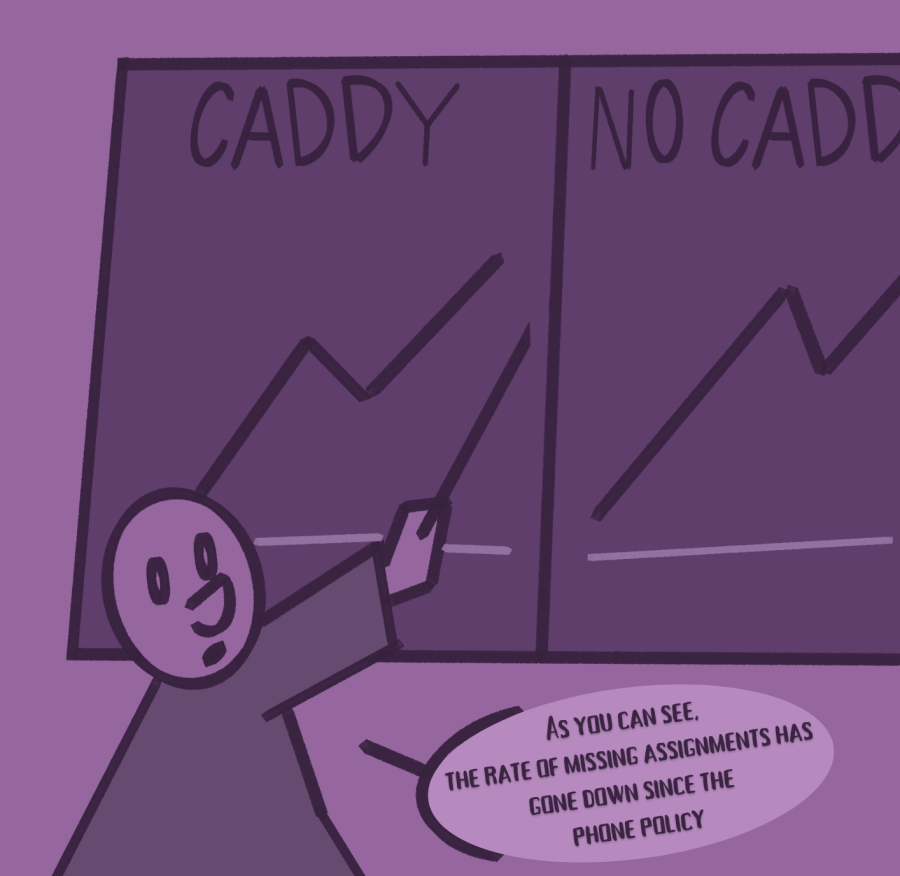Staff Editorial: Caddies Lead to Controversy
New Phone Policy Misses the Mark
The beginning of this semester posed a new mandate that each classroom is forced to abide by. When the bell rings to signal the start of a period, students have to place their phones in assigned numbered pockets hanging somewhere in the room. Failure to do so results in some form of punishment or consequence. It is only until forty-five minutes later that teachers are allowed to give their students permission to recollect their devices. The following topics are ones that we believe need to be further thought through.
Not Beneficial During Work Time
During work time, there is no opportunity for listening to music unless students use Youtube, which is far from ideal. Spotify is blocked on all school laptops, meaning accounts that hold playlists full of favorite songs are unable to be transferred over. Along with that, many students use audiobooks to listen while reading their novel for better comprehension. The process of trying to set that up on a school laptop is much more difficult than simply typing it in on their phone.
Not Doing What It Is Supposed to Do
Even with bans on websites and other restrictions placed on phones, students are still finding ways to watch shows and keep themselves entertained during class. The designated work time at the end of a period is being utilized less and less because there is no room for fun throughout the rest of the class. Intermittent breaks are essential for students to remain focused and engaged during school. While administration and other staff members might see passing periods as a time to satisfy this need, the short five minutes is the only allotted block to use the restroom or refill a water bottle, all while trying to make it across the building next to 1750 other people. It is in the middle of a period where even just a brief pause from taking notes could make all the difference if a student remains on task or not.
Students Are Not Being Taught to Self-Regulate
For many students, having their phone taken during work time is exactly what they need to get things accomplished. For others, they already know how to regulate their phone usage and keep themselves on task when needed. Many seniors are off to college next year and will not be forced to place their phones in caddies. They will be on their own when it comes to limiting their distractions and getting all of their assignments done in a timely manner. Later in life, when employed at a full time job, there will be little to no restrictions on how often they can use their phones.
It is Used as Collective Punishment
Most students throughout their high school career have proven that they are responsible enough to keep their phone during class time. They get their work done by the due date, and utilize the time given to them. However, there are other students that repeatedly have missing assignments that do benefit from this stricter, more limiting policy. The people who are constantly distracted by their phones are the ones who should be punished, not the entire student body. There is no reason for the consequences of their actions to extend beyond themselves, so the repercussions of them not having enough self-discipline has no place in the learning environment of every other student.
It is a Safety/Health Issue
When students lose access to their phones, they are also losing access to a tool that may be necessary to contact family, friends or the authorities in an emergency. With the looming threat of a shooting or other violent event, having a phone nearby can come as a form of reassurance to students. Administrators do grant exceptions for students who need phones for health reasons, but who gets to decide whose reasons for keeping their phones are valid and whose are not?
As Mr. Mueller has often said about policies at GHS, the few ruin it for the many. The new phone policy may seem as though it was a simple solution to a common problem in schools. However, it is not as straightforward as it appears. There are issues that came along with these new rules that may not have been anticipated when the policy was first introduced.







